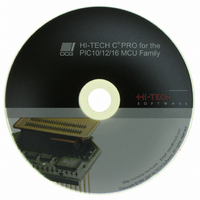SW500010 Microchip Technology, SW500010 Datasheet - Page 174

SW500010
Manufacturer Part Number
SW500010
Description
HI-TECH C PRO FOR PIC10/12/16
Manufacturer
Microchip Technology
Type
Compilerr
Series
PIC10/12/16r
Specifications of SW500010
Supported Families
PIC10, PIC12, PIC16
Core Architecture
PIC
Software Edition
Professional
Kit Contents
Software And Docs
Mcu Supported Families
PIC10/12/16
Tool Type
Compiler
Lead Free Status / RoHS Status
Not applicable / Not applicable
For Use With/related Products
PIC10, PIC12, PIC14, PIC16, PIC16E
Lead Free Status / Rohs Status
Lead free / RoHS Compliant
Other names
019P
778-1006
778-1006
778-1006
778-1006
- Current page: 174 of 502
- Download datasheet (3Mb)
Cref
5.12.1 Checksum Specifications
If you are generating a HEX file output, please refer to the hexmate section
checksums. For OBJTOHEX, the checksum specification allows automated checksum calculation
and takes the form of several lines, each line describing one checksum. The syntax of a checksum
line is:
All of addr1, addr2, where1, where2 and offset are hex numbers, without the usual H
suffix. Such a specification says that the bytes at addr1 through to addr2 inclusive should be
summed and the sum placed in the locations where1 through where2 inclusive. For an 8 bit
checksum these two addresses should be the same. For a checksum stored low byte first, where1
should be less than where2, and vice versa. The +offset is optional, but if supplied, the value
offset will be used to initialise the checksum. Otherwise it is initialised to zero. For example:
This will sum the bytes in 5 through 1FFFH inclusive, then add 1FFFH to the sum. The 16 bit
checksum will be placed in locations 3 and 4, low byte in 3. The checksum is initialised with 1FFFH
to provide protection against an all zero ROM, or a ROM misplaced in memory. A run time check of
this checksum would add the last address of the ROM being checksummed into the checksum. For
the ROM in question, this should be 1FFFH. The initialization value may, however, be used in any
desired fashion.
5.13 Cref
The cross reference list utility CREF is used to format raw cross-reference information produced
by the compiler or the assembler into a sorted listing. A raw cross-reference file is produced with
the --CR option to the compiler. The assembler will generate a raw cross-reference file with a -C
option (most assemblers) or by using an OPT CRE directive (6800 series assemblers) or a XREF
control line (PIC assembler). The general form of the CREF command is:
where options is zero or more options as described below and files is one or more raw cross-
reference files. CREF takes the options listed in Table 5.5.
174
Each option is described in more detail in the following paragraphs.
addr1-addr2 where1-where2 +offset
0005-1FFF 3-4 +1FFF
cref options files
5.15
Linker and Utilities
for calculating
Related parts for SW500010
Image
Part Number
Description
Manufacturer
Datasheet
Request
R

Part Number:
Description:
Manufacturer:
Microchip Technology Inc.
Datasheet:

Part Number:
Description:
Manufacturer:
Microchip Technology Inc.
Datasheet:

Part Number:
Description:
Manufacturer:
Microchip Technology Inc.
Datasheet:

Part Number:
Description:
Manufacturer:
Microchip Technology Inc.
Datasheet:

Part Number:
Description:
Manufacturer:
Microchip Technology Inc.
Datasheet:

Part Number:
Description:
Manufacturer:
Microchip Technology Inc.
Datasheet:

Part Number:
Description:
Manufacturer:
Microchip Technology Inc.
Datasheet:

Part Number:
Description:
Manufacturer:
Microchip Technology Inc.
Datasheet:










